|
|
|
|
|
|
|
|
|
Today, no Arctic-science events are scheduled.
|
Media
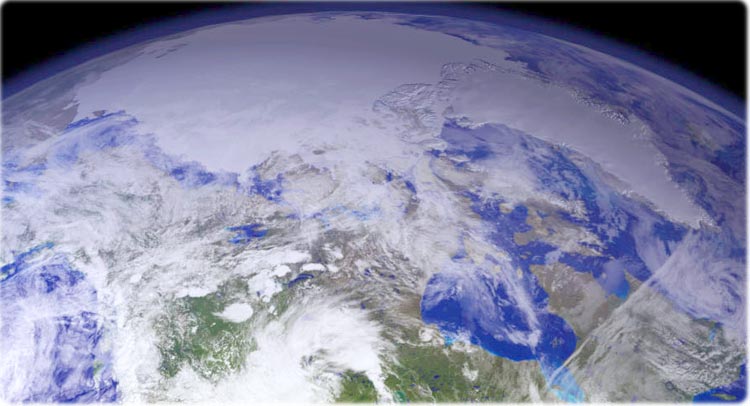 Survey: Potentials and Expectations of the Agreement on Enhancing Arctic Scientific Cooperation. Survey: Potentials and Expectations of the Agreement on Enhancing Arctic Scientific Cooperation. University of the Arctic has agreed to collect and provide information on the potentials and possible problems they have faced in getting access to Arctic and is being completed in conjunction with The Agreement on Enhancing Arctic Scientific Cooperation. This online survey is open to anyone who would like to contribute and its results will be shared in May 2019. Take the survey here.
China, Russia Find Common Cause in Arctic. China and Russia are teaming up to pursue their interests in the Arctic, and regional security expert Rebecca Pincus says the United States needs to pay more attention."We need to play a shaping role in this region. It's our backyard..." Alaska Public Radio
Andrei Chibis: We Need to Prevent People From Leaving the Arctic. Acting Murmansk Region Governor Andrei Chibis said that he intends developing conditions to slow down the local population's departure from the region and to attract more people into the region by creating additional high-paying jobs. This he pointed out is one of the main challenges facing him in his new position. On Saturday, Presidential Plenipotentiary Envoy in the Northwestern Federal District Alexander Gutsan introduced Chibis to members of the regional government, legislature and top corporate executives in the Murmansk Region. The Arctic
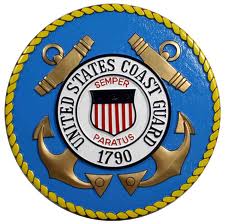 USCG to Award Contract for Polar Security Cutter 'This Spring.' USCG to Award Contract for Polar Security Cutter 'This Spring.' The U.S. Coast Guard is set to award the contract for the first Polar Security Cutter in the very near future. Giving the 2019 State of the Coast Guard address at Coast Guard Base Los Angeles-Long Beach in San Pedro, Calif., yesterday, Coast Guard Commandant Karl Schultz called the heavy icebreaker acquisition "critical to our national security and prosperity in the high-latitudes." "This is not lost on the Administration and the United States Congress, who provided the remaining $675 million dollars to fully fund the first Polar Security Cutter and provided the initial long lead materials for the second Polar Security Cutter," he said. Marine Log
Russia's 45 Scientists to Study Arctic Seas on Board Mikhail Somov Research Vessel. About 45 experts on board the Mikhail Somov vessel will study conditions of the Arctic seas and will analyze climate changes in the Arctic at the second stage of the Trans Arctic 2019 expedition between May 15 and June 10, Head of the Northern Hydrometeorology and Environment Department Roman Yershov told TASS. TASS
What Happens When a Community Gets Running Water? People Get Healthier. What's it like to go from hauling all your water and sewer to one day being able to turn on the faucet and flush a toilet? KYUK traveled to Eek to find out, where a multi-year project is wrapping up bringing running water to the community for the first time. "I don't need to heat water," Xenia Black says, turning the faucet. "I just turn that on and there it is." She laughs as clean, running water flows into a bucket. "It's easier for me to do my chores, like doing more laundry and doing more dishes." KYUK
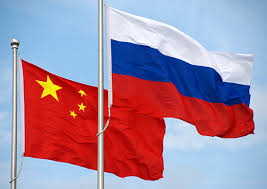 Russian, Chinese Scientists Plan Joint Arctic, Antarctic Studies. Russian, Chinese Scientists Plan Joint Arctic, Antarctic Studies. Russian and Chinese scientists will organize joint studies of the Arctic and Antarctic, they will explore mineral and biology resources in the global ocean, the Russian Academy of Sciences' Vice President Andrey Adrianov told TASS after the first meeting between representatives of the Russian and Chinese Academies of Sciences in Beijing on Sunday. "Today, representatives of the Russian and Chinese Academies of Sciences had a meeting, which also featured directors of China's several ocean studies institutes," he said. "We have agreed to expand geography of our cooperation." TASS
Whales in the Bay: Great for Sightseers, but Biologists are Concerned. An unusually large influx of gray whales into San Francisco Bay this year has thrilled boaters, beachgoers and tourists along Crissy Field, Angel Island and other shoreline locations, but the strange behavior and apparent poor condition of the magnificent sea creatures has marine biologists worried...Researchers are afraid the whales are not finding enough food to sustain them through the year because the retreating ice fields at their feeding grounds in the Arctic are forcing them to swim farther to find prey. This, in turn, means they're not fully nourished when they head south again, causing a lower birth rate and forcing the famished beasts to stop for snacks as they pass San Francisco again on their way north. San Francisco Chronicle
|
|
Future Events
Public Lecture: Sea Level Rise and What We Should Do About It, March 27, 2019 (Washington, DC, USA). The National Academies of Sciences, Engineering and Medicine hosts this event. How are melting ice sheets causing sea level rise and what can we do about it? The ice sheets in Greenland and Antarctica, along with glaciers and ice caps around the world, are melting faster than anticipated as a result of climate change caused by greenhouse gases from human activities. This rapid evolution--resulting from complex interactions between the atmosphere, the ocean, and ice--has been captured in great detail by a growing body of observational platforms that include satellites, aircraft, underwater floats, and autonomous gliders.
** New this week ** Using Field Observations and Biophysical Transport Models to Examine the Early Life Ecology of Arctic Gadids in the Chukchi and Beaufort Seas, March 28, 2019 (Seattle, Washington USA and via webinar). Par of the OneNOAA Science Seminars, Cathleem Vestlfals, post-doctoral fellow at the University of Alaska Fairbanks, will present. Arctic cod (Boreogadus saida) and saffron cod (Eleginus gracilis) are two ecologically important species in the Arctic marine ecosystem, yet little is known about their life history in the Pacific Arctic. In particular, information about their spawning locations and early life stages is extremely limited. To address some of these critical knowledge gaps and to better understand the early life histories of these species, we described the spatial and temporal distributions of their early life stages (ELS, preflexion larvae to late juveniles) in the Chukchi and western Beaufort seas based on ichthyoplankton surveys conducted in 2004, 2008, 2009, 2012, and 2013, and examined how their distributions varied in response to environmental factors.
 of the AAG includes over 8,500 geographers converging from the U.S., Canada, and nearly 60 other countries in a typical year including geographers, GIS specialists, environmental scientists, and other leaders for the latest in research and applications in geography, sustainability, and GIScience. of the AAG includes over 8,500 geographers converging from the U.S., Canada, and nearly 60 other countries in a typical year including geographers, GIS specialists, environmental scientists, and other leaders for the latest in research and applications in geography, sustainability, and GIScience.
** New this week ** Arctic "Incidents of National Significance" (IoNS) workshop, 18-19 Apr 2019, (Nome, Alaska USA). In coordination with Alaska Natives and other rural Arctic residents, Arctic IoNs planners, organized by the Arctic Domain Awareness Center (ADAC), will conduct a workshop at the UAF NW Campus to discuss the scenario of a large/violent Bering Sea storm that disables a large container ship which loses many containers, some with hazardous materials, followed by damage to coastal structures along the coast. The outcomes will inform a subsequent workshop at UAA in late May and a final report. Workshop discussions will involve experts from many sectors, and will reveal the research necessary to address capability shortfalls that are anticipated to be addressed by funded science and technology awards administered by ADAC. More information, including that on registration, is available here.
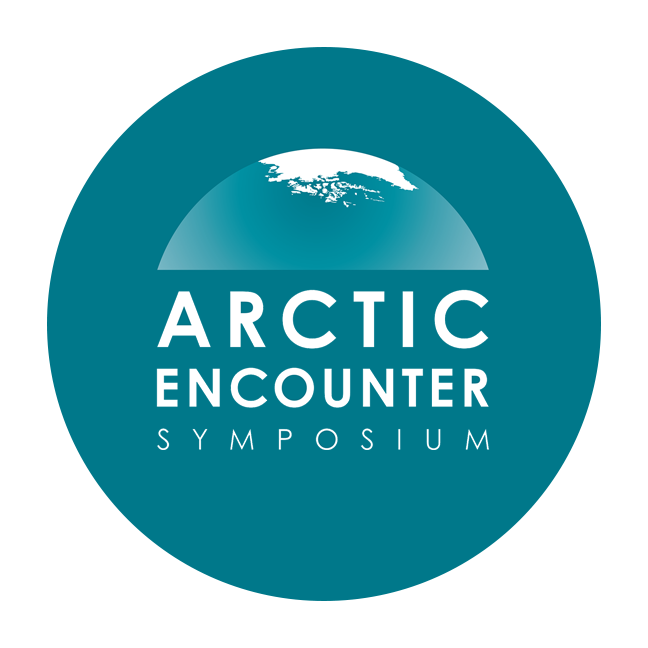 The 6th Annual Arctic Encounter Seattle, April 25-26, 2019 (Seattle, WA, USA). The sixth annual Arctic Encounter Seattle will engage the topic of innovation in the Arctic, specifically disruptive business and investment models, energy and power, climate research, national security, new economic and trade models, and popular media and awareness movements impacting the Far North. The two-day Arctic Encounter Seattle will include an opening reception, two continental breakfasts, two keynote luncheons, a networking reception with Alaskan glacier ice cocktails, and a seated three course dinner including keynotes and live musical entertainment from the Far North. The Arctic Encounter is the largest annual Arctic policy and business conference convening in the United States, with partnerships and convening efforts worldwide. Registration is now open. Additional information is available here. The 6th Annual Arctic Encounter Seattle, April 25-26, 2019 (Seattle, WA, USA). The sixth annual Arctic Encounter Seattle will engage the topic of innovation in the Arctic, specifically disruptive business and investment models, energy and power, climate research, national security, new economic and trade models, and popular media and awareness movements impacting the Far North. The two-day Arctic Encounter Seattle will include an opening reception, two continental breakfasts, two keynote luncheons, a networking reception with Alaskan glacier ice cocktails, and a seated three course dinner including keynotes and live musical entertainment from the Far North. The Arctic Encounter is the largest annual Arctic policy and business conference convening in the United States, with partnerships and convening efforts worldwide. Registration is now open. Additional information is available here.
North X North Festival, May 1-5, 2019 (Anchorage, Alaska USA).The third annual North x North Summit & Festival celebrates connection and culture across the North. The event features five days of conversations, workshops, exhibitions, performances, presentations, music, dance, installations, food, film and experiences highlighting Northern people, landscapes and cultures.The Summit (May 1-2), which is open to registered participants, focuses on resilience and research, with a special emphasis on gender and Indigenizing. The Festival (May 3-5) is open to the general public and features activities and conversations around climate, gender, innovation, food, indigenizing and earthquakes.
2019 Bering Strait Regional Energy Summit, May 7-9, 2019 (Nome, Alaska USA). This event is hosted by the Kawerak Energy Program. Regional residents, stakeholders and partner organizations are invited to come together to learn about energy resources. Attendees will share experiences with energy in their communities, gain knowledge about new energy technologies and funding sources, and help to develop creative ideas for decreasing the cost of energy in the Bering Strait Region by developing efficient, affordable, and sustainable energy projects. For more information or to receive a registration form by fax, please send an email to energy@kawerak.org or call (907) 443-4253. To receive travel funding, all registration forms must be received by April 19, 2019.
Lowell Wakefield Fisheries Symposium, May 7-10, 2019 (Anchorage, Alaska USA). This symposium aims to provide a forum for discussion on ways to facilitate effective cooperative research, a platform for scientific talks on the application and results of cooperative research, and opportunity to evaluate how such research might be best envisioned, applied and implemented. The symposium aims to involve participants from a variety of relevant marine industries, address these issues through facilitated discussion, identify best practices, and articulate a set of case studies for effective collaboration. The symposium also aims to involve scientists from a wide range of sectors, including state and federal agencies, universities, research institutes and industry science. This event is sponsored by Alaska Sea Grant College Program.
** New this week ** Arctic and Boreal Carbon: Key Findings from the State of the Carbon Cycle Report, May 14, 2019 (Silver Spring, Maryland USA or via webinar). This is seminar 10 in the Series: From Science to Solutions: The State of the Carbon Cycle, the 2nd State of the Carbon Cycle Report (SOCCR2). The speaker is Dr. Ted Schuur from the Center for Ecosystem Science and Society at Northern Arizona University. Dr. Schuur will present on changing factors that control terrestrial carbon storage in unmanaged arctic and boreal ecosystems. Surface air temperature change is amplified in high-latitude regions, as seen in the Arctic where temperature rise is about 2.5 times faster than that for the whole Earth. Permafrost temperatures have been increasing over the last 40 years.
** New this week ** Synoptic Arctic Survey - International Planning and Coordination Workshop, May 15-16, 2019 (Woods Hole, Massachusetts, USA). An open coordination and planning workshop will be held to continue planning the Synoptic Arctic Survey (SAS). The SAS is a developing international program envisioned to mount a coordinated, multi-nation, oceanographic field based effort on a Pan Arctic scale over two summer seasons (2020-2021). The key objective is to achieve a quasi-synoptic baseline understanding of the fundamental structure and function of the linked Arctic carbon-ecosystem-physical systems that will permit detection of ongoing and future changes. More information and the international science plan is available here. More info on participating in this workshop is available here.
Arctic Science Summit Week, May 22-30, 2019 (Arkhangelsk, Russia). The Arctic Science Summit Week 2019 will take place in Northern (Arctic) Federal University and Northern State Medical University, Russia, Arkhangelsk. Under the auspices of International Arctic Science Committee, participants from more than 23 countries and regions will be involved.
Resilience in Rapidly Changing Arctic Systems, proposals close June 14, 2019. This joint Belmont Forum CRA calls for co-developed and co-implemented proposals from integrated teams of natural and social scientists, and stakeholders to address key areas of arctic resilience understanding and action. This collaboration of academic and non-academic knowledge systems constitutes a transdisciplinary approach that will advance not only understanding of the fundamentals of arctic resilience but also spur action, inform decision-making, and translate into solutions for resilience. The term "stakeholder" is used here in its broadest possible sense, allowing for co-development of projects with partners from, but not limited to, civil society, government, industry, NGOs, and Indigenous organizations.
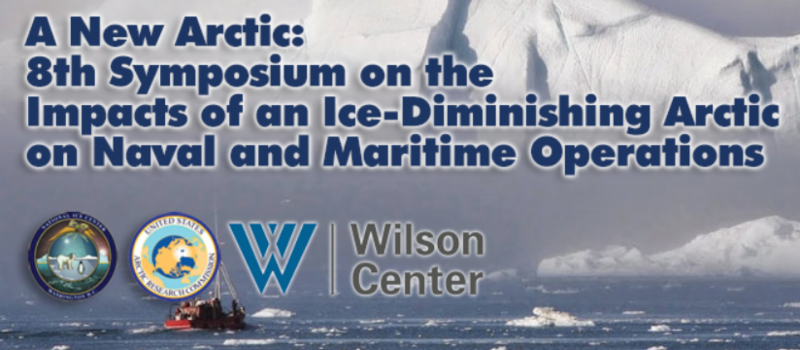
Mark your calendars to attend IDA-8, which some have called one of the best Arctic gatherings around. Historically, this biennial symposium was co-hosted by U.S. National/Naval Ice Center (NIC) and the US Arctic Research Commission (USARC). In 2019, these partners will join forces with the Wilson Center's Polar Institute, and the Patuxent Defense Forum (run by the Patuxent Partnership) as co-hosts. The now 2-day symposium will be held in the Ronald Reagan Building Amphitheater, in Washington, DC. The event will focus on a broad cross-section of naval and maritime operations and issues in an ice-diminishing Arctic. The symposium brings together nationally and internationally recognized experts on Arctic governance, geopolitics, marine operations, infrastructure, science, and environmental observations, from the local, regional, and pan-Arctic scale. Information on prior symposia, including lists of speakers, video clips, and copies of presentations, is available here. Attendance is free, and registration will begin in Spring 2019. The event will be webcast live, and video recorded.
2019 Sea Ice Symposium, August 18-23, 2019 (Winnipeg, Manitoba Canada). IGS co-hosts a sea ice symposium every 5 years. The Centre for Earth Observation Science (University of Manitoba) is excited to be hosting the first IGS event to be held in Canada. The symposium will include oral and poster sessions, and will provide a friendly and intellectually stimulating environment to facilitate face-to-face interactions and networking. Additional activities will include an opening reception, a banquet dinner and a mid-symposium afternoon excursion.
EU Arctic Forum, October 3-4, 2019 (Umeå, Sweden). The European Commission, the European External Action Service, and the Government of Sweden will jointly organize a high-level EU Arctic Forum. The EU Arctic Forum will bring together key Arctic players and stakeholders to assess recent developments in the region and to discuss the new challenges ahead.The EU Arctic Forum will include several keynote addresses and two high-level panel sessions on the morning of 3 October. Foreign ministers from EU member states as well as the Arctic Council will be invited to participate.
|
|

  
4350 N. Fairfax Drive, Suite 510
Arlington, VA 22203, USA
External links in this publication, and on the USARC's World Wide Web site ( www.arctic.gov) do not constitute endorsement by the US Arctic Research Commission of external Web sites or the information, products or services contained therein. For other than authorized activities, the USARC does not exercise any editorial control over the information you may find at these locations. These links are provided consistent with the stated purpose of this newsletter and the USARC Web site.
|
|
|
|
|
|
|
|
|